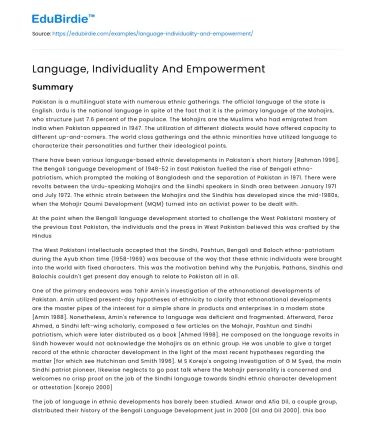Introduction
Language serves as a cornerstone of human civilization, acting as both a medium of communication and a tool for personal and collective empowerment. It is through language that individuals express their identities, forge social connections, and navigate the complexities of the world. The power of language to empower individuals is multifaceted, influencing personal identity, social dynamics, and even political landscapes. While language can be a powerful tool for self-expression and empowerment, it also poses challenges related to linguistic diversity and the potential for marginalization. By examining the interplay between language, individuality, and empowerment, this essay seeks to illuminate the profound impact language has on personal and societal development. Moreover, it will address the counter-arguments that question the extent of language's power in shaping identity and enabling empowerment.
The Role of Language in Shaping Identity
The intricate relationship between language and identity is a subject of extensive academic inquiry. Language is more than a tool for communication; it is a fundamental component of an individual's identity. According to linguist Edward Sapir, "Language is a guide to social reality," highlighting its integral role in shaping how individuals perceive themselves and the world around them. Through language, individuals convey their thoughts, beliefs, and emotions, thereby constructing and expressing their identities. For instance, bilingual individuals often report feeling as though they have different personas for each language they speak, underscoring the deep connection between language and identity.
Save your time!
We can take care of your essay
- Proper editing and formatting
- Free revision, title page, and bibliography
- Flexible prices and money-back guarantee
However, the role of language in identity formation is not without its complexities. In multilingual societies, language can serve as a marker of social distinction and a potential source of conflict. The imposition of a dominant language can lead to the marginalization of minority linguistic groups, threatening cultural diversity and individual identity. The case of indigenous languages in many countries exemplifies this challenge. Despite these difficulties, efforts to preserve and revitalize endangered languages are gaining momentum, driven by the recognition that linguistic diversity is crucial for cultural and individual empowerment. These initiatives underscore the power of language as both a personal and collective resource for maintaining cultural heritage and identity.
Language as a Tool for Social and Political Empowerment
Language's potential to empower extends beyond personal identity to encompass social and political dimensions. Language enables individuals to participate in societal discourse, advocate for their rights, and challenge existing power structures. As noted by philosopher Michel Foucault, "Discourse is not simply that which translates struggles or systems of domination, but is the thing for which and by which there is struggle." This perspective emphasizes the role of language in shaping power dynamics and facilitating social change.
Historical examples illustrate the power of language in political empowerment. The Civil Rights Movement in the United States, for instance, was marked by the strategic use of rhetoric and language to galvanize support and effect change. Leaders like Martin Luther King Jr. harnessed the power of words to inspire collective action and challenge systemic injustice. Similarly, the use of social media in contemporary movements such as #MeToo demonstrates language's evolving role in empowering marginalized voices and fostering global awareness of social issues.
Nevertheless, language's capacity for empowerment can be limited by barriers such as illiteracy and restricted access to dominant languages. These challenges highlight the need for inclusive language policies and educational initiatives to ensure that all individuals can harness the empowering potential of language. By addressing these barriers, societies can better support individuals in their pursuit of social and political empowerment.
Challenges and Counter-Arguments
Despite the empowering potential of language, it is essential to acknowledge the challenges and counter-arguments that question its efficacy. Critics argue that language alone cannot guarantee empowerment, as structural inequalities and socio-economic factors often play a more significant role in determining an individual's ability to thrive. While language is a powerful tool, it must be complemented by broader systemic changes to achieve genuine empowerment.
Furthermore, the proliferation of digital communication technologies has altered the landscape of language and empowerment. While these technologies have democratized access to information and amplified marginalized voices, they have also introduced new challenges. The spread of misinformation and the potential for digital surveillance pose threats to individual autonomy and empowerment. These complexities underscore the need for a nuanced understanding of the interplay between language and empowerment in the digital age.
Addressing these counter-arguments requires a holistic approach that considers the multifaceted nature of empowerment. Language must be viewed as one of many tools that individuals can leverage in their pursuit of self-expression and empowerment. By acknowledging the limitations and challenges, we can better appreciate the nuanced role that language plays in shaping identity and enabling empowerment.
Conclusion
In conclusion, language is a powerful conduit for individuality and empowerment, influencing personal identity, social dynamics, and political landscapes. While language serves as a vital tool for self-expression and empowerment, it is not without its challenges and limitations. As societies become increasingly interconnected, the role of language in shaping identity and enabling empowerment will continue to evolve. By fostering linguistic diversity, promoting inclusive language policies, and addressing the barriers to language access, we can harness the full potential of language as a tool for personal and collective empowerment. Ultimately, a nuanced understanding of the interplay between language, individuality, and empowerment is essential for navigating the complexities of the modern world.






 Stuck on your essay?
Stuck on your essay?

